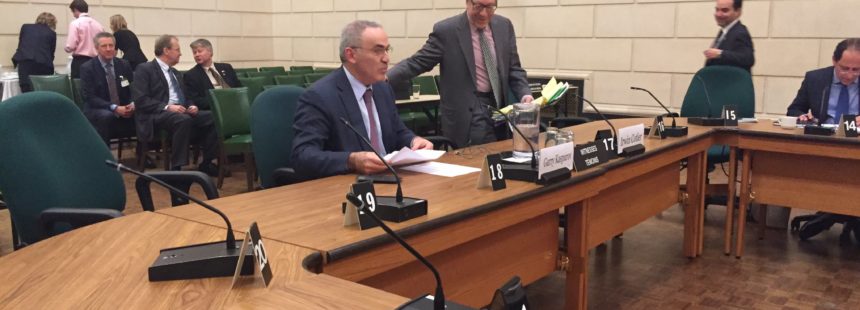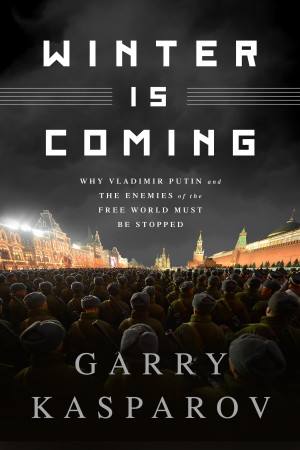

Testimony before the Canadian House of Commons
Standing Committee on Foreign Affairs and International Development (FAAE)
Special Economic Measures Act hearing
December 7, 2016
Garry Kasparov – Chairman of the Human Rights Foundation:
“I am here today to speak about the nature, the goals, and the methods of the Russian regime of Vladimir Putin. I am not an outsider or an objective observer of these things. No one can be, or should be, objective about repression, torture, murder, and war. We do not owe Putin’s victims objectivity; we owe them the truth.
Vladimir Putin is about to celebrate seventeen years of uninterrupted, unchallenged power in Russia. He was elected in 2000, after being handpicked by Boris Yeltsin, and that was the last meaningful vote Russia ever had. Democracy in Russia has been systematically destroyed, along with every other aspect of civil society that might challenge Putin’s hold on power.
Do not speak of Putin’s supposed popularity to an informed Russian. A popular leader does not need to fake elections or destroy the free media or jail critics or kill opposition leaders. Status that is artificially fashioned by twenty-four-hour propaganda, repression of all dissent, and the elimination of all rivals is not approval, it is acceptance.
In the first years of Putin’s rule, he was relatively weak and he still needed friends abroad. He made very good use of G8 membership even as he cracked down at home. How could critics like me, like Boris Nemtsov, be right when we said Putin was an authoritarian when he was welcomed as an equal with open arms and big smiles by the leaders of the free world?
The social contract Putin had with the Russian people was that he would create stability in exchange for our freedom. As oil prices fell, Putin was forced to renege on that contract. In 2011 and 2012, hundreds of thousands of Russians marched in the streets to protest election corruption and economic failure. Putin’s answer, as we now all know, was repression, propaganda, and war. To distract and rally the people, Putin no longer needed friends internationally; he needed enemies—big enemies. Anti-Western, especially anti-American, propaganda on Russian television is far more vicious than anything that ever existed in the Soviet Union in my lifetime. This war propaganda has been followed by real war, the invasion and annexation of Crimea, first denied by Putin and later proudly confirmed.
When the offensive slowed in Ukraine, Putin needed a new target, a new place to look tough: Syria. Putin isn’t there for ISIS, of course. He is there to prop up his ally Bashar Assad and to produce lots of exciting war footage for Russian television. Putin is very good at finding places where no one with the power to stop him will stand up to him. Georgia, Ukraine, Syria. The danger is that he may eventually misjudge where he can go because he has encountered so little resistance so far.
To better guarantee his hold on power, Putin has targeted the only forces he sees as threats: NATO, the European Union, and the United States. Putin has worked actively for years to undermine the unity of the free world with propaganda and by supporting politicians who share his goals. Putin’s machine supports movements like Brexit, far-right groups like those of Marine Le Pen in France and Golden Dawn in Greece, and potential agents of chaos like Donald Trump. Now Italy is on the brink.
Cyber-war, information war, the export of corruption and intimidation, these are weapons Putin uses frequently and effectively. Something must be done, and soon, because the price of stopping him will only continue to rise. Putin cannot go back to being friends; his power in Russia depends on eternal confrontation. There is no common ground, and seeking it only wastes time and further emboldens him. The language of appeasement is comforting, and politically convenient domestically, but it has always failed to stop foreign dictators, and it will always fail.
To stop Putin, to deter his aggression, you must target the only thing he cares about: his hold on power in Russia. The best way to target Putin’s power is to take aim at his agents and cronies, those who wield the levers of power and who benefit the most from Putin’s rule. By forcing Putin’s elite to choose between him and their comfortable lifestyles abroad, it is still possible to create a split, or at least to deter the worst of his aggressions. The individuals who can influence Putin must be targeted or there can be no effective deterrence. Putin does not care about the Russian people, the Russian economy, or the image of Russia abroad. I repeat: he does not care.
Dictators do not ask “why?”, they only ask “why not?” Deterrence is the answer. Very strong penalties must be ready and widely known. Deterrence is difficult because its fruits are not apparent. If it works, nothing happens. To those who say that sanctions have not worked, can you say what Putin might have done without them in place? Or say why he works so frantically to have them repealed?
Ten years ago, when I would give testimony like this, I was told that Putin was a Russian problem. I said yes, but unless he is contained, soon he will be a regional problem, and then he will be everyone’s problem. Today, Putin is in Ukraine, in Syria, meddling in American elections, waging global cyber-war, sponsoring fascists across Europe, and spreading fake news and propaganda worldwide.
The alternative to appeasement is not war, it is deterrence. The best way to avoid a conflict is to convince your opponent that he will lose. A Canadian Magnitsky Act will demonstrate the will to stand up in order to prevent more aggression. It will send the message that there are consequences for torture, for murder, and for war. It will be the most effective weapon against Putin’s new type of hybrid war of propaganda and intimidation. Make no mistake, there is a war going on whether you want to admit it or not. And it is very easy to lose a war that you refuse to acknowledge even exists.”
More about Garry Kasparov’s testimony to Canadian Parliament:
“Putin critic urges Canada to adopt sanctions against Russian officials” by CAMPBELL CLARK


